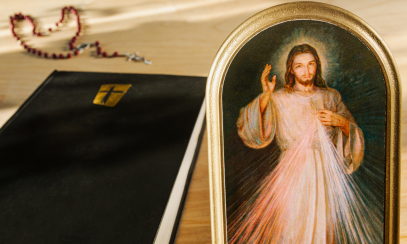
Christianity
A ‘Resolutionary’ Movement
A ‘Resolutionary’ Movement
A new year is frequently a time for renewal. We make our resolutions, which often start out with great vigor, but begin to wane by mid-January. Sometimes, resolutions last and make impactful changes in our lives, but more often they do not. By the time February rolls around, we have generally long forgotten the amendments we intended to make in our lives just a month before.
This constant failure, however, does not discount the value of making resolutions. In fact, resolution is an important element of Christian spirituality, pointing to our need for constant renewal. The fact that using the date change on the calendar as an opportunity for renewal is such a commonplace practice in our culture gives us a glimpse into our humanity. It shows us that we are aware we need renewal and consistently fall short of the ideal. Furthermore, the fact that we, as Christians, include the need for constant renewal in our spirituality shows that the faith we profess is truly a response to our needs, a response to the human condition.
At the new year, we typically make resolutions regarding our health, appearance, finances and work. We measure these by some ideal we have in our mind, either taken from our culture or from direct, lived experience. The question we must ask ourselves, however, is whether we also make resolutions based on the one person who gives us the real standard for our lives: Christ. Frequently, our resolutions are not lofty enough. We gladly resolve to make changes in our natural lives, but not often in our supernatural ones. On the other hand, our resolutions frequently are not realistic enough — they are not achievable.
The purely natural instinct to make a change misses something important: we need grace in order to make significant change in our lives. Part of the reason we fall short is that we rely on ourselves to make changes, even with respect to physical changes.
The truth of the matter is that we are always being called to renew our lives and our relationship with the Lord, but we are also constantly offered the grace to do so.
Typically with our new year’s resolution, we experience the cycle of failing and trying again. The same is true in our spiritual lives. Making frequent usage of the Sacrament of Reconciliation helps us to see that our growth can be gradual and dependent upon God’s grace. We try, we fail, we reconcile, we try again, we fail and so on. It is important to remember that this is also what growth looks like and that, over time, we will see transformation.
So, this year, let’s continue to make resolutions, not just at the beginning of the year, but at every new beginning we can identify. Let’s make resolutions that are optimistic but also realistic. The way to do both of these involves self-reflection — taking the form of a frequent examination of conscience perhaps. As we grow closer to Christ, we know ourselves better, particularly in the areas where we need God’s grace most.
Michael Martocchio, Ph.D., is the diocesan secretary for evangelization and director of the Office of Catechesis and Christian Initiation. Email him at mmartocchio@charlestondiocese.org.



